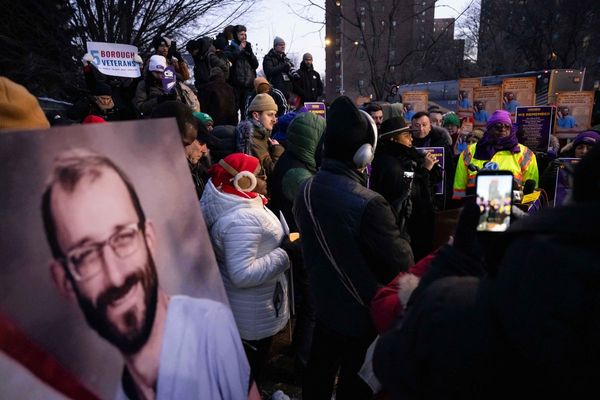
Even Vladimir Soloviev, a state TV host, was having trouble swallowing the loss of Russia’s flagship cruiser Moskva last week as he took aim at a rare target: the Russian military.
“You just tell me how you were able to lose it,” he said in an extended temper tantrum on his talkshow, one of Russia’s most popular. “Tell me, what the hell were you doing in that particular area of the Black Sea at that moment?”
Soloviev remains pro-Putin and pro-war. But the rare outburst has pointed to how the stress of Russia’s war in Ukraine has grown as the invasion enters its third month, with both sides announcing a “new stage” in the conflict in the “battle for Donbas”.
Kremlin officials have shown no signs of contrition. Vladimir Putin decorated the 64th Separate Motorized Rifle Brigade for its “mass heroism and courage” after the same unit had been accused by Ukraine of committing war crimes in Bucha.
But as the cost of the invasion has grown, some unlikely critics of the war have also grown more outspoken.
“I don’t see a SINGLE beneficiary of this mad war!” wrote the outspoken businessman Oleg Tinkov in a statement on Tuesday. “Innocent people and soldiers are being killed. Generals have woken up from their hangover to understand they have a shit army. And why would the army be good, if everything else in the country is shit and rife with nepotism, lackyism, and servility?
“Dear ‘collective west’, please give Mr Putin a clear exit to save his face and stop this massacre.”
Russian MPs have suggested charging him with discrediting the Russian armed forces.
On both sides of a polarised Russian society, the failures of the first stage of the war have raised the stakes of the conflict, turning what the Kremlin calls a “special operation” into an existential one.
“We are seeing that the fate of Putin, Russia and society as a whole is being merged into one,” said Greg Yudin, a sociologist. “I hear more often that while people think the war might have been a mistake, they say there is no way back; they say ‘we’ve got to finish the job.’”
Marina Litvinovich, an opposition activist and politician who has remained in Russia, said she saw the war as a stress test for the government that threatened to bring down the “colossus with clay feet” that Putin had built over 20 years in power.
But among ordinary Russians, she also sees clear signs of war fatigue brought on by a flood of information from the early days of the invasion. Apathy is on the rise.
“I see people becoming used to the war,” said Litvinovich. “From some kind of nightmare or horror, the war has become ordinary for many.”
People were “emotionally burnt out”, she said, and were increasingly turning away from the news even as the failures onboard the Moskva cruiser were exposed.
Meanwhile, the early economic shocks of the war had passed for many, and few were looking to the economic recession to come.
“Right now there’s this kind of false sense that life has normalised,” she said. “People think that the economic difficulties have passed.”
The government has taken extraordinary steps, including the introduction of capital controls, to prevent an economic collapse. Maxim Reshetnikov, the head of Russia’s Ministry of Economic Development, claimed on Tuesday that the country had “withstood the first blow of sanctions”.
But within the business community, there are clear signs of distress, as international companies continue to exit Russia on a daily basis. The Moscow mayor has predicted the loss of 200,000 jobs, proposing that out-of-work professionals can be retrained or temporarily employed, including doing “socially important” work in parks.
Several big names have voted with their feet. The Russian business daily Vedomosti reported on Monday that Lev Khasis, a former senior executive at the state-owned Sberbank, had left the country for the US.
But government officials have mostly remained in their posts. Temporary work stoppages at some large factories have not led to the kind of economic protests that the Kremlin is truly concerned about.
“Putting aside personal positions about the war (some are for, some are against), people are mobilising and working as hard and creatively as possible,” a senior director for a major metals company said. “They understand that they need to give it their all for the company and themselves to survive.”
New polling from the independent Levada Centre has indicated that Russian views on the west in particular grew more negative in March, likely due to sanctions and vocal western support for Ukraine.
Those thoughts have largely been encouraged by Russian state media, where remarks that would have been considered fringe and genocidal, including calls for the erasure of Ukrainian culture, have increasingly been made on print and in primetime.
“There are a lot of people who actually believe in this stuff,” said a senior manager in a state news agency. “And even if not, any Russian person at our level is apoliticised. It’s not for us to analyse the decisions … made by the bosses.”
The Kremlin may want to finish the war as soon as possible, aiming for 9 May Victory Day, which marks the defeat of Nazi Germany.
“But judging by the way the operation is going, he may prolong the hostilities, and 9 May will be just a day to achieve intermediate goals,” said Andrei Kolesnikov of the Carnegie Moscow Centre.







